Inside the Penn State fraternity battle sparked by one student's tragic death
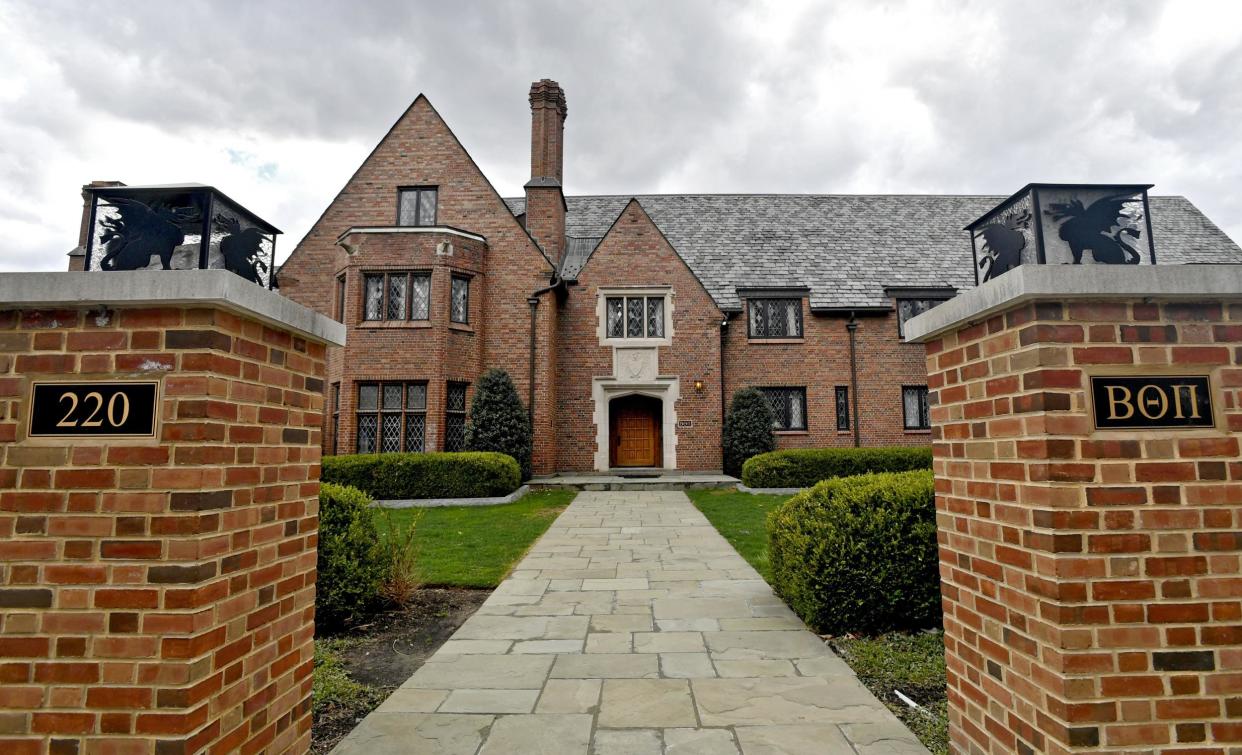
This spring, the 140-year tradition of Greek life at Penn State University nearly came to a dramatic end.
The university's constellation of fraternities and sororities – exclusive, Greek-letter social clubs that encompass nearly 20 per cent of the student population – seemed on the verge of collapse.
In a single weekend in April, nine of the university's fraternities and sororities had violated the university's restrictions on drinking and social events. One fraternity had already been suspended for hazing its pledges and circulating photos of nude, unconscious women online. Members of Greek life were 50 per cent more likely to binge drink, and 50 per cent more likely to be sexually assaulted, than their fellow students, according to internal statistics.
And two months earlier, a 19-year-old student had fallen down a flight of concrete stairs at a fraternity house and died.
A post shared by Penn State University (@pennstate) on Jun 11, 2017 at 11:52am PDT
The death of Timothy Piazza, an engineering student and Beta Theta Pi fraternity pledge, put Penn State on the frontlines of an ongoing, national battle: How to control fraternities and sororities. Even now, six months on, progress has been slow – and controversial.
Piazza had pledged himself to what the school described as a “model” fraternity. The Beta Theta Pi brothers outwardly maintained a “no alcohol” and “no hazing” policy, as mandated by their national organisation. Their off-campus fraternity house – which housed a large portion of their newer members – had been recently renovated, with security cameras installed throughout the building. They hosted honours students for a lunch on their front lawn every year.
But on the night of 2 February, court records claim, the brothers of Beta Theta Pi brought 14 underclassman pledges into their basement and forced them to perform a binge-drinking ritual known as “the gauntlet”.
Over the span of two minutes, Piazza and his fellow fraternity hopefuls were said to have consumed the equivalent of four to five drinks each. Apparently goaded by the senior fraternity brothers, they shot-gunned a beer, chugged from a wine bag, and took 10-second-long “pulls” from a handle of vodka. Then, they went upstairs to a party and drank more.
At one point during the night, a forensic pathologist determined, Piazza had a blood alcohol content between .26 and .36 per cent – more than four times the legal limit.
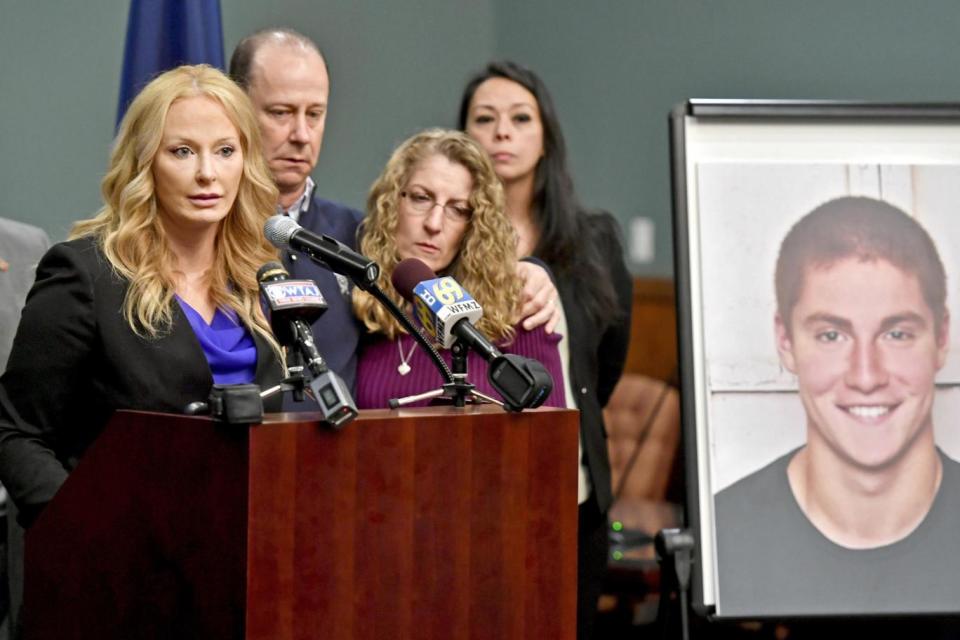
Less than an hour and a half into the party, Piazza can be seen in surveillance footage stumbling through the house, making his way to the basement steps. There, prosecutors allege, the 200-pound teenager tumbled head-first down 15 concrete stairs and landed, motionless, at the bottom.
The footage shows Piazza’s fraternity brothers responding to the crash. They emerge from the basement carrying his limp, unconscious body. They drop him on the couch and strap a backpack to his back – an attempt to keep him from rolling over and choking on his own vomit in his sleep. A bruise blossoms across his back and abdomen.
One fraternity member, Kordel Davis, says he asked his fraternity brothers to call 911. Surveillance footage shows him being shoved angrily out of the way.
Piazza attempted to move from the couch repeatedly throughout the night. At one point, he rolled onto the floor and remained there, curled in the fetal position. At another point, he used his hands to push himself upright, but immediately crumpled to the ground. In the rare instances in which Piazza managed to stand, he would stumble around the house, running into walls and railings, and inevitably fall again.
Brothers who encountered Piazza throughout the night largely ignored him. One brother took a picture on his phone, and, according to police, posted it to Snapchat.
Around 10 the next morning, the complaint alleges, the fraternity brothers discovered Piazza’s cold, rigid body on the floor of the basement. They conducted frantic Google searches, texted their friends, and eventually, 40 minutes later, called 911.
Piazza was pronounced dead the next day. According to medical records, surgeons found four litres of blood – about 80 per cent of his total blood supply – pooled in his abdomen. His spleen was shattered and covered in blood clots. Surgeons removed almost half of the right side of his skull to alleviate swelling in his brain.
A post shared by Penn State University (@pennstate) on Apr 29, 2017 at 7:05pm PDT
Centre County District Attorney Stacy Parks Miller conduced a months-long investigation into the circumstances of Piazza's death. Eventually, her office announced more than 850 charges – including involuntary manslaughter – against Beta Theta Pi and 18 of its brothers.
The charges are explained in a graphic, 80-page indictment, which lays out a harrowing version of the night in question.
After learning the full extent of what had happened that night, Piazza’s parents said, they were “sickened”.
“It was awful,” Jim Piazza told The Independent. “As a friend of mine's wife put it to me, ‘Tim was crucified’.”
As a response to his son’s death, Mr Piazza said, “people all over the country are asking for change, including former greek life people.”
He added: “They're saying enough is enough, and they want change”.
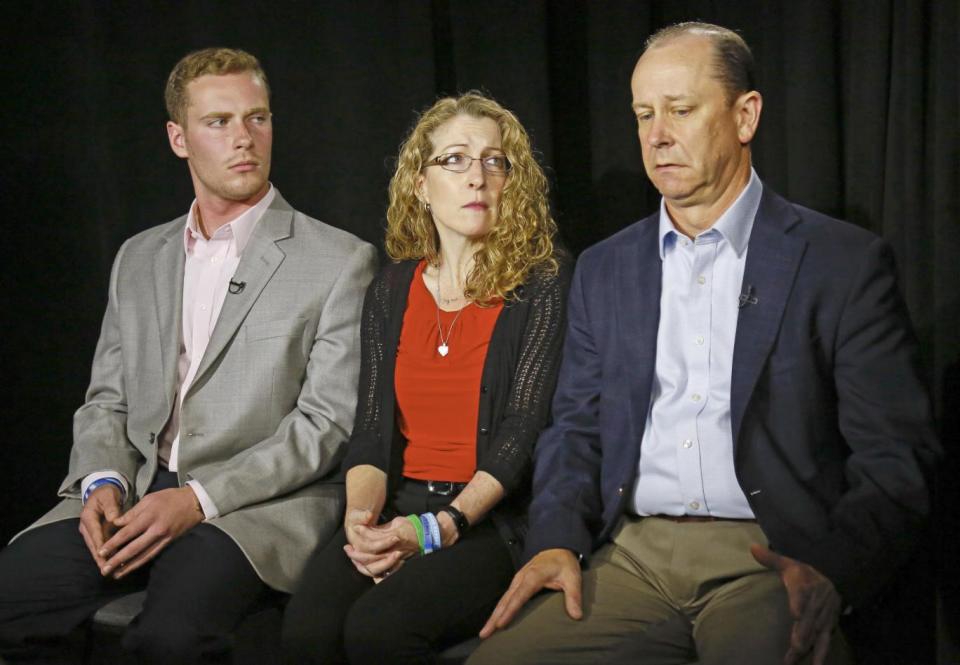
Universities have been trying to “change” fraternities since the day they arrived on campus.
The earliest fraternities were formed in secret – an escape from the the dull, religious lifestyle that permeated higher education at the time. According to historian Nicholas Syrett, the groups operated largely as secret societies, because their very existence was illegal. The first fraternity at Penn State was closed, in fact, because the administration felt it was “generally bad” and would not “promote the proper atmosphere at the university”.
Today, the majority of the fraternities are formally recognised by their institutions. While many of them volunteer in the community and give back to the campus, they are best known for the behaviour glorified in movies like “Animal House” and “Old School”: They trash their houses, annoy the neighbours, and generally act as a thorn in the side of the administration.
But they also provide schools with some significant benefits.
Fraternities house and feed a large number of students – resources the school would otherwise have to provide. Because fraternity brothers are more likely to be well-off when they enter college, they’re also more likely to donate to their institutions when they graduate.
Plus, Greek life is crucial means of attracting students to those institutions in the first place.
According to sociologist Lisa Wade, fraternities offer prospective students the kind of fun, debaucherous lifestyle they’ve come to expect from a modern college education. They provide students with the stereotypical narrative of wild parties, hot hookups, and flowing alcohol – all conveniently located outside the university's jurisdiction.
Because of their historical independence, fraternities can promise prospective students the best time of their lives, without universities having to risk their own.
“The phrase,” Ms Wade said, “is perverse incentives.”
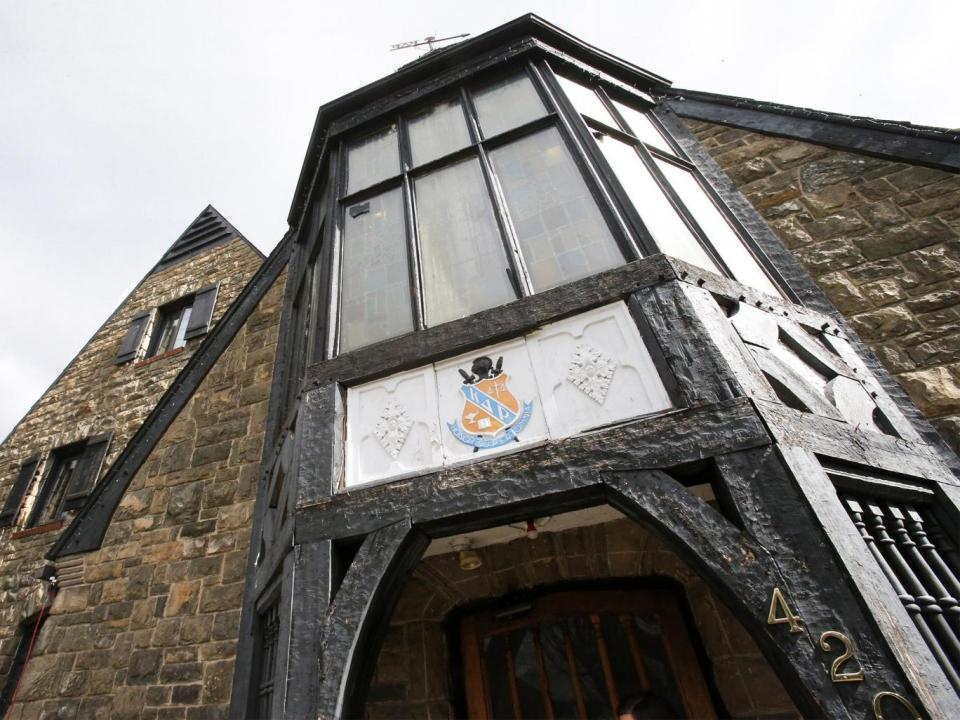
Damon Simms, the Vice President for Student Affairs at Penn State, acknowledged some of the benefits fraternities can bring.
“[Fraternities] create opportunities for students to build community among themselves,’ Mr Sims told The Independent. “This is a very large campus, and it's nice to be broken down into smaller communities that students can feel comfortable in and gain friendships from.”
He also acknowledged that Penn State, up to this point, has done a poor job of policing them.
“Fundamentally, what the prior situation was, was one where these organisations were largely self-governing,” he said. “...So a lot of [Greek life] was largely outside of us, largely beyond our reach, although we were advising it.”
Fraternities at Penn State was largely overseen by a body known as the Interfraternity Council (IFC). Made up of fraternity presidents and other members, the IFC set their own rules, monitored their own compliance, and administered their own discipline.
“The administration had almost no way of knowing that stuff was going on other than people in the IFC telling them,” said Frank Esposito, the former Greek life reporter for Penn State’s student newspaper. “...And the level of secrecy practised by the fraternities made it nearly impossible to know if this was going on or not.”
In an illuminating example, the former IFC president, Alex Frederick, stepped down in the wake of Piazza’s death, after the university discovered his own fraternity had been hazing its pledges.

To Jim and Evelyn Piazza, the fault for their son’s death rests squarely on the shoulders of a negligent administration.
“Penn State has responsibility because it could have put a stop to it,” Mr Piazza said. “It could have put policies and procedures in place, and enforced the policies and procedures it already had in place. That would have, I believe, prevented anything like this from happening.”
According to Mr Simms, however, that era of negligence is over. The school has already cracked down on parties, reducing the number allowed for each chapter to 10 per semester. They have banned hard alcohol from greek functions, and required all drinks to be poured by a trained server.
The school will also differ Greek recruitment by one semester next year, meaning students will not be allowed to pledge until their second semester at Penn State. Any fraternity or sorority caught hazing those pledges will be permanently banned from campus, in what the school calls a “zero tolerance” policy.
To enforce these new rules, the school is creating an office of fraternity and sorority compliance. They will hire new staff members to build relationships with the fraternities and sororities, while at the same time monitoring their social activities.
“I think that's sort of a declaration that people are going to be held accountable in way that perhaps they haven't been in the past,” Mr Simms said. “... And where we find that they're falling short, we are willing to winnow away at the absolute number of these organisations in our community, and hope that the rest change.”
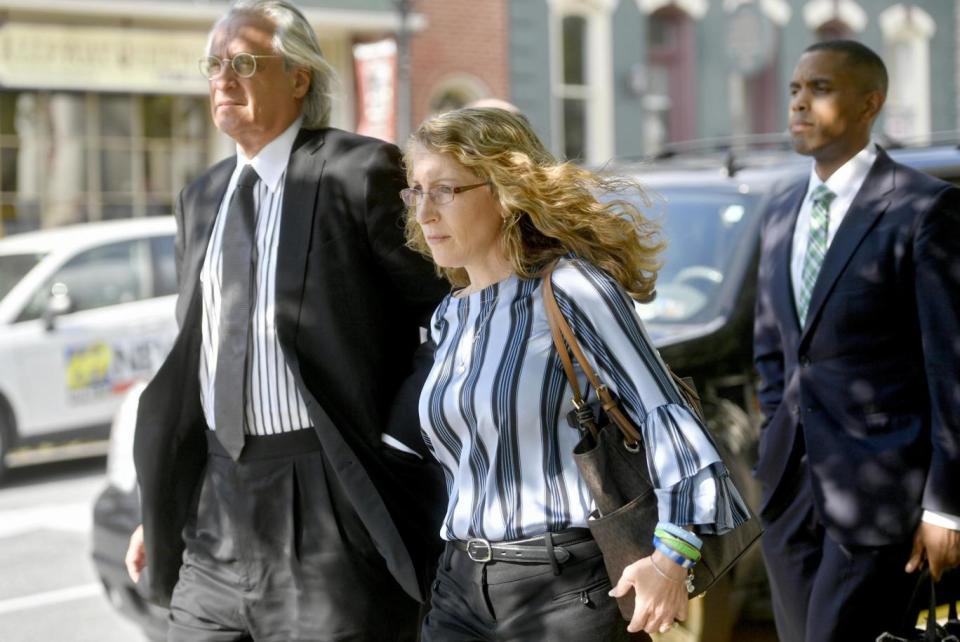
The Penn State fraternities, unsurprisingly, were not thrilled about this idea.
When the administration assembled a Greek life task force after Piazza’s death, fraternity and sorority members were invited to offer “constructive suggestions," spokesperson Lisa Powers told the Daily Collegian. In the end, however, the administration "heard from very few among them." Eventually the students stopped offering suggestions completely, and communication broke down.
The IFC contested this depiction, saying in a 3 April statement that they were “deeply disappointed the university administration did not follow through on its promise to engage students before making critical decisions”.
On 30 March, the day the latest sanctions were announced, some members of Greek life held a silent protest on the steps of the administrative building. Several members held signs reading, "Make Greek Life Great Again."
In an email to The Independent, IFC Vice President of Communications Michael Cavallaro said the body is now “supportive” of the changes imposed by the administration, aside from deferred recruitment. He pointed to several reforms that the IFC plans to implement itself, including increased new member education, an investment in new professional staff, and the publication of all chapter disciplinary records.
“Many of these changes align with – and even go further than – the measures [Penn State President Eric Barron] outlined in June,” Mr Cavallaro said. “We agree that added social restrictions, education, transparency and professional staff support are critical.”
He was also quick to point out, however, that the administration's new “zero tolerance” policy applied only to hazing infractions – not to drinking or partying.
A post shared by Penn State University (@pennstate) on Jul 17, 2017 at 10:08am PDT
The eighteen fraternity brothers charged in Piazza's death spent much of their summer in a courtroom in central Pennsylvania, attending preliminary hearings that would determine whether their case went to court.
On 11 August, the judge delayed this decision. He had recently learned that someone in the fraternity house might have deleted surveillance video from the night in question.
The judge also ordered a contempt hearing for Tim Bream – Penn State's head football trainer and the live-in adviser for Beta Theta Pi. A detective in the case testified that Mr Bream had been in the house the night of Piazza's death, and that he had overseen three other events in which alcohol was present. Text messages between the brothers allegedly suggest "Tim" had advised them to delete social media evidence of the incident.
Mr Bream, who has not been charged in connection with the case, did not appear in court and declined to comment to The Independent under advisement of counsel.
The allegations of collusion by a Penn State staff member made the possibility of reform seem even more distant. Not that it would surprise Ms Wade, the sociologist and Greek life scholar.
“Fraternities are by definition pushing the boundaries of what’s allowable, and they are by definition giving the middle finger to administrations that try to control them," she told The Independent. “They have been avoiding reforms, avoiding the efforts of administrators to change them, for 200 years."
Piazza’s parents also doubt the latest round of reforms will make much difference.
“Some of those are a nice start,” Mr Piazza said of the new rules. “But let's face it, going from 45 parties per semester to 10? I mean come on, really?”
As for the “zero tolerance” policy on hazing, he said: “[Penn State] had that anyway and they never enforced it. They knew hazing was going on and they obviously did nothing about it.”
Even Mr Simms, the man charged with championing this new Greek life policy, seemed unconvinced that the fraternities could be reformed.
Asked if implementing these policies earlier could have saved Piazza’s life, he replied: “I think that nothing that we do is going to guarantee that tragedy is going to be avoided.”
“These are adults, they live in private circumstances in their own homes,” he said. “...I would not say that anything that we can do – any collection of things we can do at any time – guarantees that bad outcomes might not result. That's sort of the way the world is.”
The court case looking into the circumstances of Mr Piazza's death continues.

